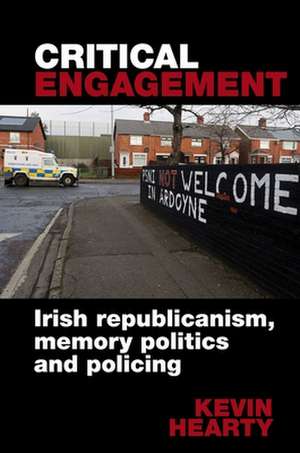Critical Engagement – Irish republicanism, memory politics and policing
Autor Kevin Heartyen Limba Engleză Hardback – 18 sep 2017
studies, critical criminology and transitional justice, this book uses original interviews with political activists, community workers and former combatants from across the spectrum of modern Irish republicanism to draw out how the past frames internal tensions within the Irish republican
constituency as those traditionally opposed to state policing structures opt to buy into them as part of a wider transitional process in post-conflict Northern Ireland. The book critiques the challenges of making peace with the enemy against a backdrop of communal narratives and memories of historic injustice, counterinsurgency policing and human rights abuse that do not simply disappear when war turns to peace. Through a rich empirical basis the book offers an
insight into these challenges from the perspective of those who were, and remain, in the thick of the Irish republican debate on policing. In doing so it provides an acute insight into the role that individual and collective memory plays in reshaping ideological outlooks, understanding processes of
political transition, contextualising 'moving on' processes with former enemies and conditioning views of post-conflict police reform.
Preț: 286.56 lei
Nou
Puncte Express: 430
Preț estimativ în valută:
54.84€ • 56.93$ • 45.73£
54.84€ • 56.93$ • 45.73£
Carte indisponibilă temporar
Doresc să fiu notificat când acest titlu va fi disponibil:
Se trimite...
Preluare comenzi: 021 569.72.76
Specificații
ISBN-13: 9781786940476
ISBN-10: 1786940477
Pagini: 288
Dimensiuni: 162 x 240 x 22 mm
Greutate: 0.54 kg
Editura: Liverpool University Press
ISBN-10: 1786940477
Pagini: 288
Dimensiuni: 162 x 240 x 22 mm
Greutate: 0.54 kg
Editura: Liverpool University Press
Notă biografică
Kevin Hearty is a Lecturer of History, Queens University Belfast.
Descriere
This book is an original case study of how memory has driven and challenged the Irish republican transition from armed conflict to constitutional politics that culminated in the acceptance of policing in the Northern Ireland state.
